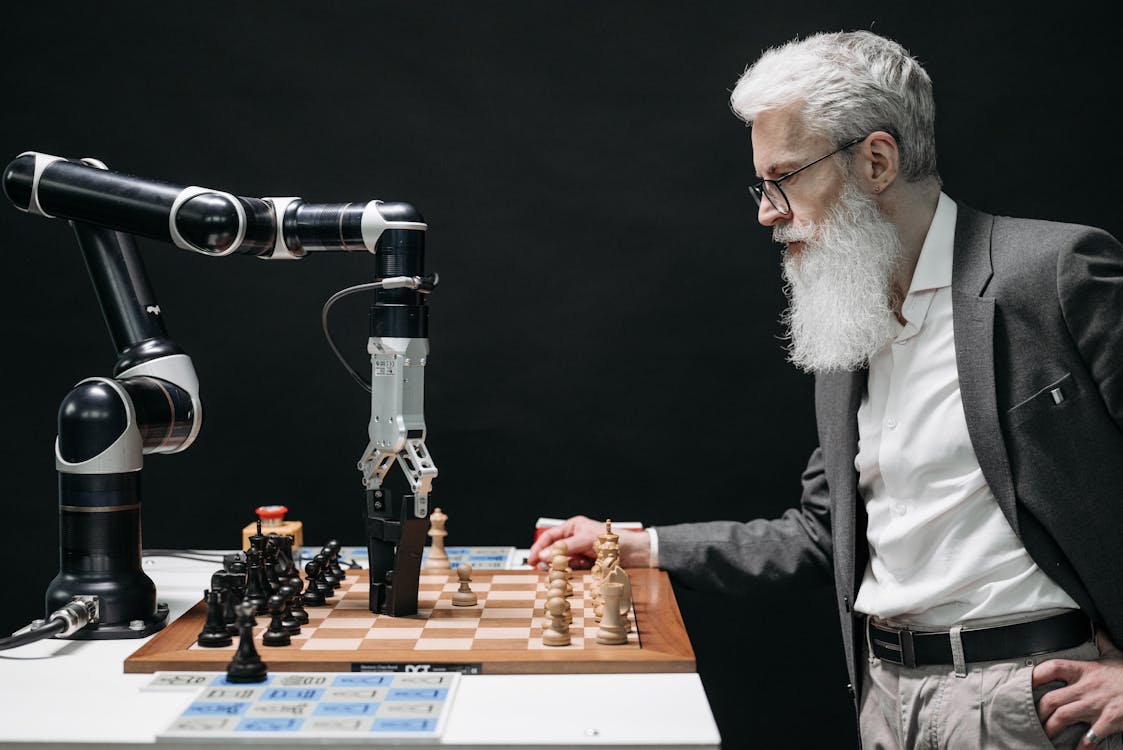Artificial intelligence (AI) is changing the way we work at an astonishing pace. From self-checkout machines to AI-generated content, automation is creeping into almost every industry. While some fear that robots and algorithms will take over, others believe that human skills will always be irreplaceable in certain jobs.
So, which jobs are safe from automation? And why will some careers remain human-driven no matter how advanced AI becomes? Let’s break it down.
Jobs Most at Risk of Automation

Before diving into the “safe” jobs, let’s take a quick look at the industries most vulnerable to AI and automation.
🔴 Manufacturing & Warehouse Work – Robotics has already replaced many factory and warehouse jobs, performing repetitive tasks with precision and speed.
🔴 Data Entry & Basic Administrative Roles – AI can process data much faster than humans, making jobs like manual data entry and even some customer service roles obsolete.
🔴 Retail & Fast Food Services – Self-checkout machines, AI-powered ordering kiosks, and robotic kitchen assistants are rapidly reducing the need for human cashiers and food service workers.
🔴 Basic Accounting & Financial Analysis – AI tools can now track expenses, analyze spending patterns, and even predict financial trends, cutting down the need for human accountants in many cases.
🔴 Transportation & Delivery – Self-driving trucks and drones are already being tested for deliveries, which could significantly reduce human-driven jobs in logistics.
While these jobs are at risk, not all hope is lost. Many positions still require creativity, emotional intelligence, and complex decision-making—areas where humans excel.
Jobs That Are Safe from Automation
Now, let’s talk about careers that AI is unlikely to replace anytime soon.
1. Healthcare Professionals (Doctors, Nurses, Therapists)
Why AI can’t replace them:
- AI can assist in diagnosis, but it lacks human empathy and ethical reasoning.
- Surgery, patient care, and emotional support require a human touch.
- Therapists and counselors rely on deep emotional intelligence, something AI can’t replicate.
AI-powered tools like IBM Watson can analyze medical scans faster than doctors, but they still need human oversight. Patients trust people, not machines, when it comes to their health.
2. Creative Professions (Writers, Designers, Musicians, Artists)
Why AI can’t replace them:
- AI-generated content can be impressive, but it lacks original thought and emotional depth.
- Great art, music, and writing often come from personal experiences and human emotions, which AI doesn’t have.
- Creative storytelling, branding, and innovation require human imagination.
Sure, AI tools like Midjourney and ChatGPT can generate designs and write content, but they don’t create with soul. A novelist or filmmaker who writes from personal experience will always have an edge over AI-generated content.
3. Skilled Trades (Electricians, Plumbers, Carpenters, Mechanics)
Why AI can’t replace them:
- These jobs require hands-on problem-solving that can’t be automated.
- Every home and repair situation is unique, making automation difficult.
- Skilled workers must adapt on the spot, something AI struggles with.
No robot can crawl under a sink to fix a complicated plumbing issue or diagnose an unusual car problem as quickly as an experienced human. Skilled trades will always be in demand.
4. Teachers & Educators
Why AI can’t replace them:
- Teaching requires personal connection, motivation, and adaptability.
- Students learn best through interaction, encouragement, and mentorship.
- AI can assist with personalized learning, but human teachers provide real guidance.
While AI tools can help students with tutoring (think Duolingo or Khan Academy), they can’t replace the passion, patience, and adaptability that human teachers bring to the classroom.
5. Mental Health & Social Work
Why AI can’t replace them:
- Empathy, deep listening, and understanding cannot be automated.
- AI chatbots can provide basic mental health support, but they can’t replace human connection.
- Therapists and social workers navigate complex emotions and relationships that AI can’t comprehend.
Mental health support is about more than just giving logical advice—it’s about feeling heard, understood, and supported by another human.
6. Law & Legal Professions
Why AI can’t replace them:
- AI can analyze contracts and review legal documents, but it can’t argue in court.
- Lawyers interpret laws, negotiate, and persuade—all human-driven skills.
- Every legal case is unique, requiring strategic thinking and judgment that AI lacks.
While AI legal assistants help speed up paperwork, the role of a defense attorney, judge, or mediator still requires deep human reasoning.
7. Emergency Services & Public Safety (Firefighters, Police, Paramedics)

Why AI can’t replace them:
- These jobs involve split-second decision-making that AI can’t replicate.
- Emergency responders risk their lives to save others—AI simply can’t do that.
- Dealing with unpredictable situations (like rescuing people from a fire or de-escalating conflicts) requires human instinct.
Robots might assist with search and rescue, but humans will always lead the way in emergency situations.
The Human-AI Collaboration: The Future of Work
Instead of fearing AI, the smartest approach is to work alongside it. Here’s what the future looks like:
AI will handle repetitive tasks, allowing humans to focus on creativity and problem-solving.
New jobs will emerge in AI development, ethical AI management, and AI-human collaboration.
Upskilling will be essential—learning critical thinking, emotional intelligence, and adaptability will make you future-proof.
Rather than replacing us, AI enhances our abilities and helps us work more efficiently. The key to job security in the AI age is to develop skills that machines can’t replicate.
Final Thoughts: Will AI Take Your Job?
The answer? It depends on what you do.
If your job involves repetitive, predictable tasks, AI might take over. But if it requires creativity, emotional intelligence, complex decision-making, or hands-on expertise, you’re likely safe.
The future of work isn’t about AI vs. humans—it’s about how we use AI to enhance what we do best. The best thing you can do? Stay curious, keep learning, and embrace the AI revolution.

